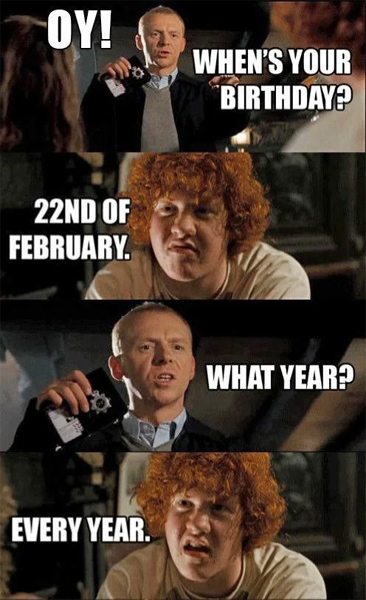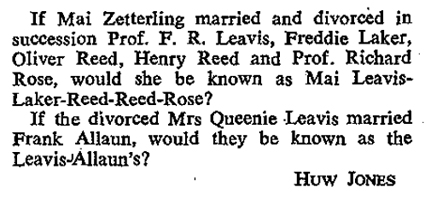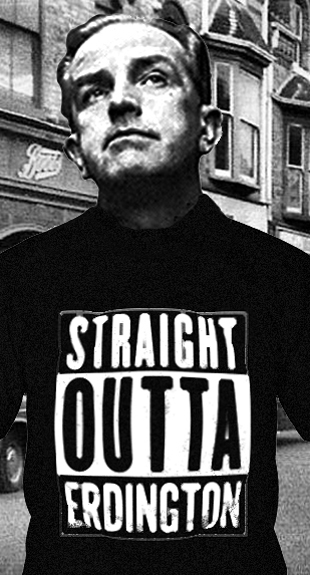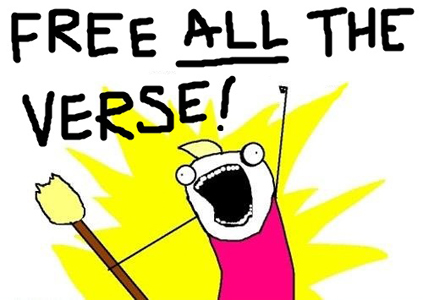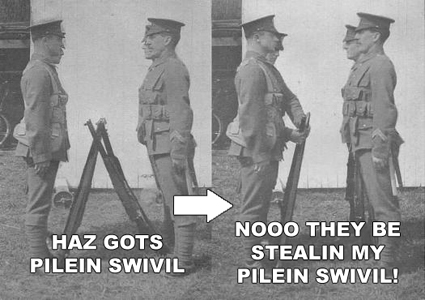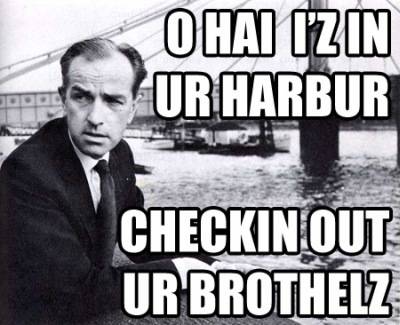|
|
Documenting the quest to track down everything written by
(and written about) the poet, translator, critic, and radio
dramatist, Henry Reed.
An obsessive, armchair attempt to assemble a comprehensive
bibliography, not just for the work of a poet, but for his
entire life.
Read " Naming of Parts."
|
Contact:
|
|
|
|
Reeding:
|
 |
I Capture the Castle: A girl and her family struggle to make ends meet in an old English castle.
|
 |
Dusty Answer: Young, privileged, earnest Judith falls in love with the family next door.
|
 |
The Heat of the Day: In wartime London, a woman finds herself caught between two men.
|
|
|
|
Elsewhere:
|
|
All posts for "LOL"
|
|
|
27.7.2024
|
|
1537. Radio Times, "Full Frontal Pioneer," Radio Times People, 20 April 1972, 5.
A brief article before a new production of Reed's translation of Montherlant, mentioning a possible second collection of poems.
|
|
1536. L.E. Sissman, "Late Empire." Halcyon 1, no. 2 (Spring 1948), 54.
Sissman reviews William Jay Smith, Karl Shapiro, Richard Eberhart, Thomas Merton, Henry Reed, and Stephen Spender.
|
Seen everywhere on all the internets, the original comes from Hyperbole and a Half: " This is Why I'll Never Be an Adult." Of course, T.S. Eliot would have added this caveat, having famously said, "No verse is free for the man who wants to do a good job."
|
1535. Reed, Henry. "Talks to India," Men and Books. Time & Tide 25, no. 3 (15 January 1944): 54-55.
Reed's review of Talking to India, edited by George Orwell (London: Allen & Unwin, 1943).
|
Here's a nice little piece of pop culture, which is not only a good laugh, but a good gauge of where Reed stood in the public eye in his later life. The New Statesman's reader competition for June 22, 1973:
Weekend Competition No 2,261
Set by Young Werther
To revert to an old joke-form ('If Lee Marvin married the Princess Lee Radziwill would he be known as Lee Marvin-Lee Radziwill?'), it would be intriguing to know whether, if Beatrice Webb had been around to marry Michael Foot, she would be known as Beatrice Webb-Foot, or if Grace Wyndham Goldie had married D. B. Wyndham-Lewis, she would have been known as Grace Wyndham-Goldie-Wyndham-Lewis. Competitors are asked to supply up to five such examples. Entries by 3 July. (Real names only) And the results, published on July 13: Result of No 2,261
Report by Old Goethe
The same couples came up with surprising and rather disappointing frequency. Too many Brown-Windsors, with only John Fuller providing a plausible explanation; too many Virginia Woolfs and J. M. Whistlers, Grace Darlings and W. G. Graces, Billie Jean Kings and Bobby Fischers, and nothing quite on par with the legendary match between Tuesday Weld and Frederic March's eldest boy (she'd have been Tuesday March 2nd). Under the circumstances, it seemed sensible to bend the rules somewhat. £1 for each of those printed. Those printed included: If Maude Gonne could have married Richard West, would she have been known as Maude Gonne-West?
Brenda Rudolf
If Ellen Terry could have married Dylan Thomas, would she have been known as Ellen Terry-Thomas?
If Margaret Drabble married Sir Leonard Gribble, would she be known as Lady Margaret Drabble-Gribble?
Jedediah Barrow
If Gladys Hay married Ronald Biggs, divorced him and married Stephen Spender, would she be known as as Gladys Hay Biggs Spender?
Lee Woods
If the future Mrs Bernard Levin married W. H. Auden after her divorce, and after that divorce married Sir Alfred Ayer, would she be known as Lady Levin-Auden-Ayer?
Arabella Wittgenstein And the entry which caught our attention: If Mai Zetterling married and divorced in succession Prof. F. R. Leavis, Freddie Laker, Oliver Reed, Henry Reed, and Prof. Richard Rose, would she be known as Mai Leavis-Laker-Reed-Reed-Rose?
Huw Jones
Mai Zetterling was a Swedish-born actress; F.R. Leavis was, of course, a distinguished literary critic; Frederick Laker was an airline entrepreneur; Oliver Reed played Athos in The Three Musketeers and should need no introduction; and Richard Rose is an American political scientist who has taught primarily in the UK, and has a CV as long as my arm. The pun is a play on Burns, and I had to sound it out, twice.
|
1534. Reed, Henry. "Radio Drama," Men and Books. Time & Tide 25, no. 17 (22 April 1944): 350-358 (354).
Reed's review of Louis MacNeice's Christopher Columbus: A Radio Play (London: Faber, 1944).
|
"Weird" Al Yankovic has an excellent song, "Bob," which is not simply a parody of Bob Dylan's "Subterranean Homesick Blues," but also an intelligent exercise in palindromes. The music video (YouTube) for "Bob" is a faithful re-creation of the opening sequence to the 1967 Dylan documentary by D.A. Pennebaker, Don't Look Back.
All this reminded me of a promotional gizmo which came out for the release of the Dylan retrospective on CD last year, which we will now use for our own purposes to summarize Henry Reed's poem, " Chard Whitlow," in ten cue cards or less:
"Chard Whitlow" is itself a parody of T.S. Eliot's Four Quartets, so the circle of life and satire is now complete.
|
1533. Friend-Periera, F.J. "Four Poets," Some Recent Books, New Review 23, no. 128 (June 1946), 482-484 [482].
A short review calls A Map of Verona more pretentious than C.C. Abbott's The Sand Castle; influenced by Eliot, Auden, MacNeice, and Day Lewis.
|
In which we discover the true reason behind the recruits' lack of piling swivels in the second stanza of Reed's poem, "Naming of Parts":
They stolez 'em! Inspired, of course, by the renowned " I Has a Bucket."
|
1532. Vallette, Jacques. "Grand-Bretagne," Mercure de France, no. 1001 (1 January 1947): 157-158.
A contemporary French language review of Reed's A Map of Verona.
|
Here you go: a synopsis of Henry Reed's poem, " Sailor's Harbour," translated into lolcat, image macro-format. A lolreed, if you will:
That about sums it up, I think. Also, I would like to point out, I totally had this idea before Chaucer's " I Can Hath Cheezburger?" post, but I waffled (or perhaps ROFL'd, if you prefer).
|
1531. Henderson, Philip. "English Poetry Since 1946." British Book News 117 (May 1950), 295.
Reed's A Map of Verona is mentioned in a survey of the previous five years of English poetry.
|
|
|
|
1st lesson:
Reed, Henry
(1914-1986). Born: Birmingham, England, 22 February 1914; died: London, 8
December 1986.
Education: MA, University of Birmingham, 1936. Served: RAOC, 1941-42; Foreign Office, Bletchley Park, 1942-1945.
Freelance writer: BBC Features Department, 1945-1980.
Author of:
A Map of Verona: Poems (1946)
The Novel Since 1939 (1946)
Moby Dick: A Play for Radio from Herman Melville's Novel (1947)
Lessons of the War (1970)
Hilda Tablet and Others: Four Pieces for Radio (1971)
The Streets of Pompeii and Other Plays for Radio (1971)
Collected Poems (1991, 2007)
The Auction Sale (2006)
|
Search:
|
|
|
Recent tags:
|
Posts of note:
|
Archives:
|
Marginalia:
|
|
